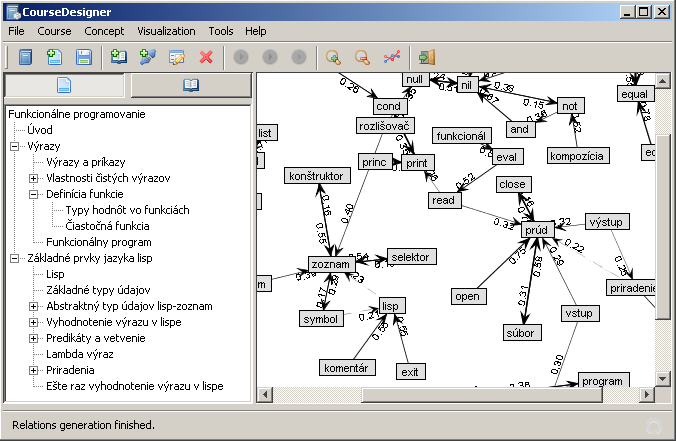|
Domain Concepts Relationships Discovery Marián Šimko Master thesis project supervised by prof. Mária Bieliková |
Motivation
To enable educational systems adapt to an user according to her actual knowledge, it is neccesary to provide metadata about learning objects contained in the course. Adaptative algorithms use metadata to infer, reason and present personalized content. Manual construction of such metadata is tedious and time-consuming task. Relationships between concepts representing knowledge are counted in hundreds. Defining such a number of relations is for human almost impossible.
Method
The method of automated course metadata generation is based on knowledge discovery techniques. First, we preprocess input learning objects and create their vector representation. The terms with the highest relevation are extracted, which we consider to be pseudoconcepts (suitable to become concepts). In the next step, we generate relationships between concepts. The composed domain model is checked and fine-tunesd by a teacher.
Crucial part of the method is inter-pseudoconcept relatedness score computation. For this purpose we proposed several variants:
Each variant of relatedness score computation provides a unique view of the actual domain model state and employs a specific approach to knowledge discovery.
The first variant of relatedness score computation is based on text mining methods. We compose a vector representation which we map onto the corresponding concepts, where pseudoconcept similarity is determined by algebraic calculation. The principle of the spreading activation variant is to think of the domain model as of a contextual network. After the spreading activation method is applied, the mutual relatedness of pseudoconcepts we compute basing on the activation energy values associated to pseudoconcepts. The third variant is similar to querying the web space - the result for each query (e.i. pseudoconcept) is the list of the most relevant (related) pseudoconcepts.
Evaluation
We experimented with proposed method in the domain of programming learning. We developed CourseDesigner authoring tool that integrates proposed method. Using the tool we generated functional progmamming course metadata, which we compared to manually composed metadata layer. The experiment and its results are described in more detail in publications listed below.

Acknowledgments
The method is a part of the PeWePro project.Publications
- Šimko, M.
- E-Course Authoring: Method for Automated Metadata Generation. In Proc. in Informatics and Information Technology Student Research Conference IIT.SRC 2008, pp. 110-117.
- Šimko, M.
- Relationships discovery in educational course content. Master thesis, Slovak University of Technology in Bratislava 2008. 58p.
 pdf (in Slovak)
pdf (in Slovak)
- Šimko, M., Bieliková M.
- Educational concepts mutual relatedness discovery. In Proc. of 3rd Workshop on Intelligent and Knowledge Oriented Technologies, WIKT 2008, Smolenice, Slovakia, 2008. (In Slovak)
- Šimko, M., Bieliková M.
- Automatizing the e-course metadata generation. In Proc. of Znalosti 2009, Brno, Czech republic, 2009. (In Slovak) [to appear]
| to Homepage | to Teaching | to the Top |
|
||
|
||